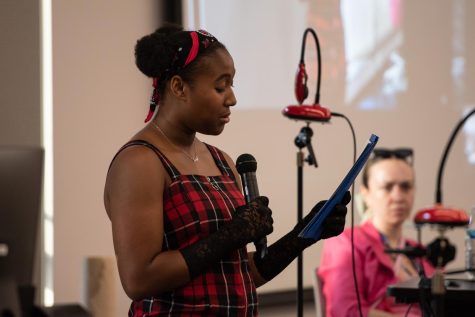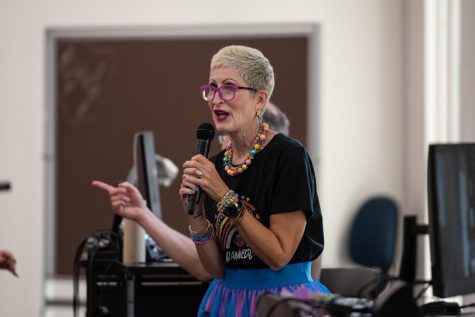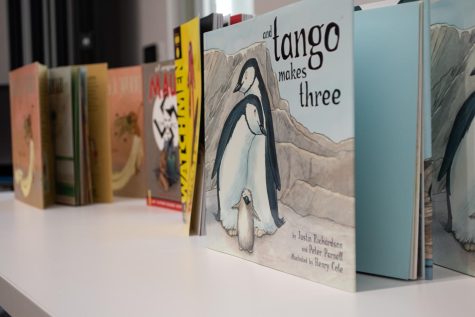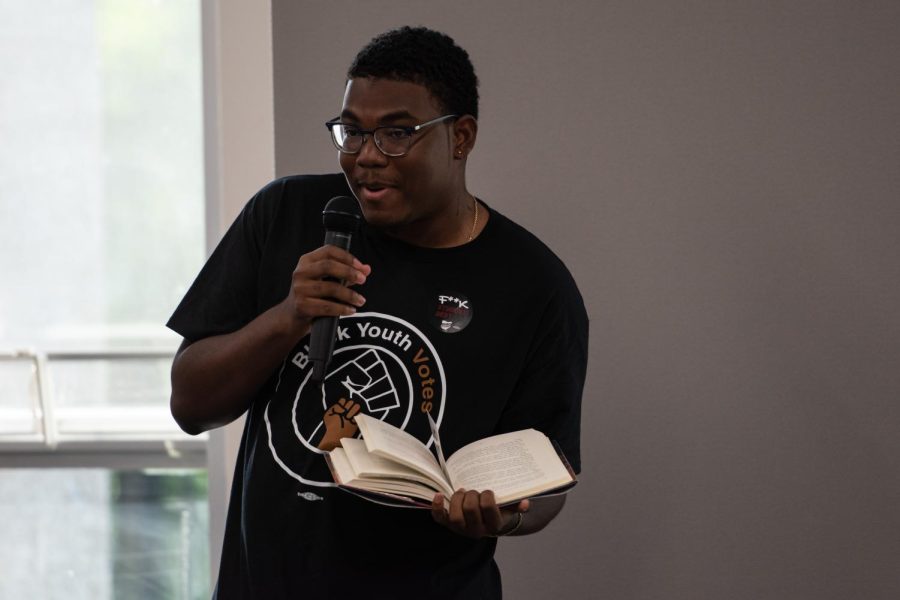Kent celebrates Banned Books Week with second annual read-in
Akii Butler reads a few pages from J. K. Rowling’s “Harry Potter” during the second annual Banned Book Reading.
A night of reading, cosplay, food and prizes marked the second annual read-in as students and faculty gathered to celebrate Banned Books Week.
The Wednesday night event was held in Taylor Hall, open-mic style for any Kent State community member to read a passage from their favorite banned book. Participants were also encouraged to dress as their favorite character for the chance to win a notable banned book for themselves.
Jaelyn Brown, a junior communications studies major, was one of the first attendees to read and dress up

as a character from her chosen book, ‘The Handmaid’s Tale.”
Making this read-in her first, Brown was both excited and nervous to actively participate. She expressed surprise at the magnitude of the banned books issue.
“I was looking through a list of banned books and I didn’t realize how many books were banned,” Brown said. “Even children’s books, like I saw one of my old favorite books, “Brown Bear, What Do You See?” is a banned book, and so I just think that it’s important to support those things, support these causes and be here for stuff like this.”
Around 23 different novels, plays and poems were read throughout the event, with some well-known choices like “Harry Potter” and “The Giver.”
In addition to the wide variety of published works being read, Eric Mansfield, assistant vice president of university communications and marketing, and proclaimed playwright, chose to read from his upcoming play “Trial by Fire.”
“This was a play I started back last spring from just seeing the growing tension across America,” Mansfield said. “It’s a modern drama about a woman of color who’s in her first teaching job at a mostly all boys school. She teaches the women’s studies program and starts to take books from the banned book list. The community finds out, all turn on her and she’s put on trial.”
As the readings came to a conclusion, students began to share their emotional attachments to the books and professors who encouraged them.

Stephanie Smith, associate professor and creator of the read-in, explained the difference between this read-in and the first, wasn’t in the number of attendees— but in demographic and feeling.
“We definitely have more emotion,” Smith said. “I think you could probably feel some of that emotion, and I love it. We had a diversity of students reading, and we’ve definitely had more students speaking.”
As the students and food began to disappear and the event came to an end, the attending faculty reflected on their thoughts on the event and subject of banning books.
One recurring thought related to the surprise in how unaware students were about the extent of banned books.
“It’s happening at a greater rate than it has in years past. It’s not new, but it continues,” Smith said. “It’s accelerated, and that’s from all sides of the political spectrum. It isn’t always political either, it could be spiritual or it could be cultural.”
Paul Haridakis, director of the School of Communication Studies, also agreed that despite the history of banned books, the issue continues to grow.
“Book banning represents not just how important our communication skills are, it’s how fearful we are of the power of that communication in the hands of skilled people,” Haridakis said. “And that’s really why we have to understand both. We can’t study skills without understanding the fear that the power of communication can generate.”
Smith explained the issue comes from not only those who directly ban books, but also groups like parents, advocating for the banning of books school-wide.
“I thought, what could I do that wouldn’t be angry, but joyful,” Smith said. “Because reading should be joyful, and that’s how I thought of the read-in. You have a sit-in, a teach-in and a dine-in, why not a read-in?”
Mariah is a reporter. Contact her at [email protected]


Matthew is a senior photography major and The Kent Stater's visuals editor. He has a passion for photography and traveling.
Contact him at [email protected].



